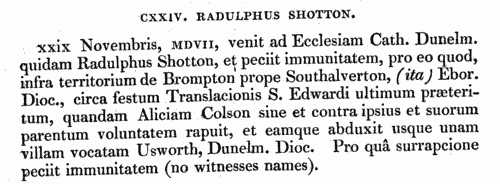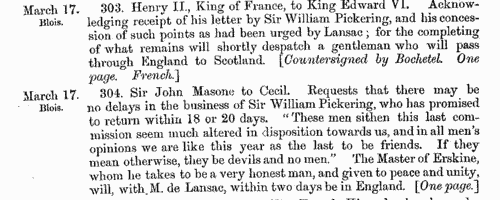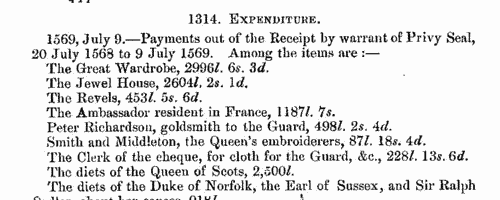Bog Surname Ancestry ResultsOur indexes 1000-1999 include entries for the spelling 'bog'. In the period you have requested, we have the following 19 records (displaying 1 to 10): Single Surname Subscription | | | Buying all 19 results of this search individually would cost £100.00. But you can have free access to all 19 records for a year, to view, to save and print, for £100. More... |
These sample scans are from the original record. You will get scans of the full pages or articles where the surname you searched for has been found. Your web browser may prevent the sample windows from opening; in this case please change your browser settings to allow pop-up windows from this site. Essex Poll Tax: Sturmer
(1381)
Charles Oman transcribed and edited the poll tax returns for Hinckford (Public Record Office Lay Subsidy Essex 107/68) for his study of the peasants' rising of 1381. Full lists of adults are given, township by township, grouped by status or occupation. There are returns for Alhamston & Buris (Alphamstone and Bures), Bewchamp Oton (Belchamp Otten), Bumstede ad T'rim (Steeple Bumpstead), Felstede (Felstead), Fynchyngfelde (Finchingfield), Gelham Parva (Little Yeldham), Gosfeld (Gosfield), Hythingham Sibill (Sible Hedingham), Ovyton (Ovington), Pentelowe (Pentlow), Salyng Magna (Great Saling), Stebbyng (Stebbing), and Sturmer.BOG. Cost: £6.00.  | Sample scan, click to enlarge

| Murderers sheltering in Durham Cathedral: and their victims
(1464-1524)
Criminals could evade pursuit by claiming sanctuary in Durham Cathedral. Persons who took refuge fled to the north door of the cathedral, and knocked for admission. There were two chambers over the door in which men slept, for the purpose of admitting fugitives at any hour of the night. As soon as anyone was so admitted, the Galilee bell was immediately tolled, to give notice that someone had taken sanctuary. The offender was required to declare before witnesses the nature of his offence, and to toll a bell in token of his demanding the privilege of sanctuary. He was then provided with a gown of black cloth with a yellow cross, called St Cuthbert's Cross, upon the left shoulder. A grate was provided near the south door to sleep upon, and for 37 days sufficient provisions and bedding were provided. But within 40 days he had to appear before the coroner, clothed in sackcloth, and be branded on his right hand with the sign of the letter A. This signified that he was swearing to abjure the realm: he was then free to leave the country unhindered. The petitions for immunity were entered in the diocesan registers, usually with the marginal note 'Peticio Immunitatis': those from 18 June 1464 to 10 September 1524 (the privilege was finally abolished in 1624) were edited and printed by the Surtees Society in 1837 under the title Sanctuarium Dunelmense. Some of the criminals came from a considerable distance: the great majority were murderers or homicides. Each entry usually gives full name, original address, (often) trade, a brief description of the crime, often with date, and usually the name of the victim, as well as the witnesses to the petition. This index covers all the surnames given.BOG. Cost: £4.00.  | Sample scan, click to enlarge

| Ambassadors, ministers, soldiers and spies
(1547-1553)
The State Papers Foreign of king Edward VI consist mainly of letters and reports concerning England's relations with continental Europe, particularly the Netherlands and France. This calendar was edited by William B. Turnbull and published under the direction of the Master of the Rolls in 1861. The main text (to page 290) is abstracts of 710 letters from official correspondents abroad; but the remainder of the volume, entitled Calais Papers, deals with the English enclaves on the French coast.BOG. Cost: £4.00.  | Sample scan, click to enlarge

| Tradesmen of York
(1272-1558)
No man or woman could trade in the city of York without having obtained 'freedom' of the city.Their names were recorded on the 'Freemen's Roll', or Register of the Freemen of the City of York, which contains about 19,900 names for this period. A list of names was prepared for each year, the year being here reckoned as starting at Michaelmas (29 September) until 1373, and thence at Candlemas (2 February). Each annual list starts with the name of the mayor and the camerarii or chamberlains. The chamberlains were freemen charged with the duty of receiving the fees of the new freemen; of seeing that only freemen traded in the city; and of preparing this roll, which was compiled from the names on their own account books from the receipts for the fees. There are three groups of freemen: those who obtained freedom after serving out an apprenticeship to a freeman; the children of freemen; and those who claimed freedom by 'redemption', i. e. by purchase or gift from the Mayor and Court of Aldermen.
BOG. Cost: £2.00.  | Sample scan, click to enlarge

| Cecil Manuscripts
(1540-1571)
Letters and papers of the Earl of Hertford and (1551-1571) sir William Cecil, Secretary of State. Also includes some miscellaneous material as early as 1306.BOG. Cost: £4.00.  | Sample scan, click to enlarge

| Scottish litigants, rebels and cautioners
(1569-1578)
The Privy Council of Scotland exercised a superior judicial authority in the kingdom, and consequently received and dealt with a constant stream of petitions, as well as dealing with the internal security of the state. This register of the council from July 1569 to June 1578, in the reign of king James VI, was edited by John Hill Burton, Historiographer Royal for Scotland, and published under the direction of the Lord Clerk Register of Scotland in 1878. Some of the individuals mentioned are the complainants, those of whom they complained, and the sureties on both sides: at this period, some of the complainants are alleging serious attacks, often of a feuding nature. Many of the bonds entered into by the cautioners are promises to keep the peace towards such enemies. Failure to answer to the council when summoned was a serious contempt, leading to being denounced a rebel, with serious consequences. But 'horning' was also used in the pursuit of debts: there was no imprisonment for debt in Scotland, but a creditor could have an obstinate debtor ordered, in the sovereign's name, to pay what was due, failing which, the debtor could be put to the horn, denounced as a rebel, and imprisoned as a rebel.
BOG. Cost: £4.00.  | Sample scan, click to enlarge

| Anglo-Scottish relations
(1509-1589)
The State Papers Relating to Scotland is the collection of English government documents dealing with relations with Scotland when the latter was still an independent country.
BOG. Cost: £4.00.  | Sample scan, click to enlarge

| Cecil Manuscripts
(1583-1589)
Letters and papers of William Cecil lord Burghley, Lord Treasurer of England.BOG. Cost: £4.00.  | Sample scan, click to enlarge

| Scottish litigants, rebels and cautioners
(1585-1592)
The Privy Council of Scotland exercised a superior judicial authority in the kingdom, and consequently received and dealt with a constant stream of petitions, as well as dealing with the internal security of the state. This register of the council from 1 August 1585 to 31 July 1592, in the reign of king James VI, was edited by David Masson, and published under the direction of the Lord Clerk Register of Scotland in 1881. Some of the individuals mentioned are the complainants, those of whom they complained, and the sureties on both sides: at this period, some of the complainants are alleging serious attacks, often of a feuding nature. Many of the bonds entered into by the cautioners are promises to keep the peace towards such enemies. Failure to answer to the council when summoned was a serious contempt, leading to being denounced a rebel, with serious consequences. But 'horning' was also used in the pursuit of debts: there was no imprisonment for debt in Scotland, but a creditor could have an obstinate debtor ordered, in the sovereign's name, to pay what was due, failing which, the debtor could be put to the horn, denounced as a rebel, and imprisoned as a rebel. The main text (to page 774) is from the Acta Secreti Concilii, containing the minutes of the Privy Council, with intermixed Acta Proper (political edicts), Decreta (judicial decisions), Acta Cautionis (acts of caution) and Bands (registration of bonds). After that are printed some miscellaneous Privy Council documents from the same years: additional acts of caution (775-778); ordinances and acts anent the Borders and the North (779-814); and miscellaneous privy council papers (815-834). The sources most productive of names, the Acta Cautionis and Registration of Bands, are also the most repetitive in form, and are not transcribed verbatim and literatim: nevertheless, one of the editor's rules was for 'All proper names and names of places occurring in the originals to be preserved in the abstracts without exception, and in the exact original spelling.'
BOG. Cost: £4.00.  | Sample scan, click to enlarge

| Scottish litigants, rebels and cautioners
(1592-1599)
The Privy Council of Scotland exercised a superior judicial authority in the kingdom, and consequently received and dealt with a constant stream of petitions, as well as dealing with the internal security of the state. This register of the council from August 1592 to May 1599, in the reign of king James VI, was edited by David Masson and published under the direction of the Deputy Clerk Register of Scotland in 1882. The publication brings together the contents of the principal register (Acta Secreti Concilii) with acts and bands (bonds) of caution (surety) from the registers called Acta Cautionis (pp 561-730); Acts and Ordinances relating to the Borders and the North (731-748); and Miscellaneous Privy Council Papers (749-769). Many of the individuals mentioned are the complainants, those of whom they complained, and the sureties on both sides: at this period, many of the complainants are alleging serious attacks, often of a feuding nature. Many of the bonds entered into by the cautioners are promises to keep the peace towards such enemies. Failure to answer to the council when summoned was a serious contempt, leading to being denounced a rebel, with serious consequences.
BOG. Cost: £4.00.  | Sample scan, click to enlarge

|
| 1 | 2 |  |
Research your ancestry, family history, genealogy and one-name study by direct access to original records and archives indexed by surname.
|












